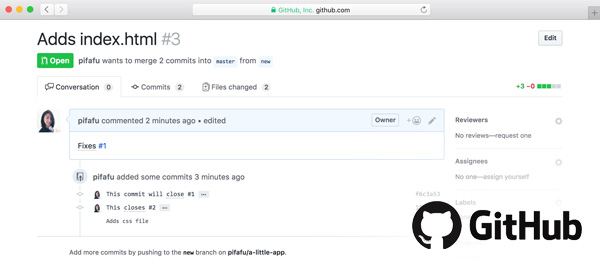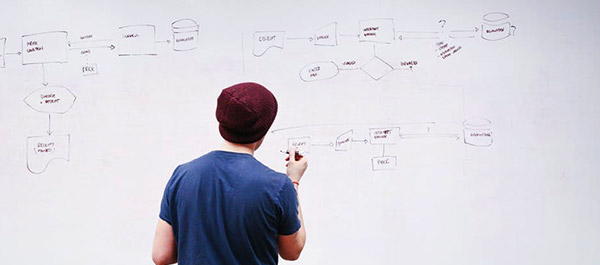So you didn’t do a degree in computer science at a university, but you want a career in software development. Why? Because you know software development is often well-paid, can offer flexibility, is likely to be stimulating and is part of a growth industry. Perhaps you want to become an app developer, a back-end web engineer or a website developer: all careers on the up. But is it still possible? Actually, yes. Here’s 10 steps on how to switch to a career in coding and succeed.
1. Don’t underestimate what you do know
First, sit down and think about what you do know. Believe it or not, that philosophy major you did has its uses. What are they? You’ve probably picked up analytical skills, critical reading skills, the ability to assemble and simplify large tracts of information, clear writing, and even people skills, such as working in groups or pairs. Think of your old career as a stepping stone. Don’t undersell yourself when putting together your CV. Also, people who blend a variety of seemingly disparate skills are often in high demand, because they now have a unique professional profile – for example, think of a software developer who has done a fashion degree. Think how better placed you’d be for a job designing websites or apps for a clothing retailer than someone who doesn’t know fashion.

2. Now decide on the best route for learning what you don’t know
There are a variety of options to achieve this, from an online MOOC (Massive Open Online Courses), which is free, to a coding bootcamp, which can be face-to-face or online. Coding bootcamps are great for the following reasons:
- Offering a focused environment
- Mentorship when you need it
- Teaching you the essentials to land a job
- Assuming no prior knowledge, plus will teach you the basics
- Offering a network of motivated peers
- Instituting progress checkpoints
- Providing career services
However, face-to-face bootcamps can be expensive and inflexible. You may want to opt for an online bootcamp, like those offered at Hyperion Development, where you would have your own mentor. These are ideal when you want the benefits of a face-to-face bootcamp but are on a budget and need to be able to learn in a flexible manner from anywhere because of time constraints and existing commitments.
3. Give yourself an actual project
What do you feel passionate about? Animal rights? Archery? Fitness? Think about creating a website, an app, a game, some software. Have a look at codeconquest for some great coding project ideas. Now do it.

4. Showcase what you know
You’ve been doing a few projects, a little bit of coding, and now can put some stuff together. It’s time to open an account with GitHub, a software development platform, where you can host and review code, manage projects, and build software alongside millions of other developers. Add your existing code to share with prospective employers or start new projects to keep yourself relevant. GitHub accounts are free, and it’s the best place to swap ideas and code with other programmers online.
<Tip> Be selective with what you show on your GitHub profile. A public repository allows anyone to read your code. Hiring managers might well check out your code there. Only make substantial or interesting projects available for viewing.

5. Understand that you will need to invest in your career change
From books to classes to subscriptions, training to become a software developer is going to cost something. Accept this. However, off-play it against the expected salary you’re likely to earn. Check out these figures for interest.
An entry-level software developer in 2017 in South Africa will earn R234 502 per year.
Hired in their 2017 ‘State of Global Tech Salaries’ notes that the average software engineer in Seattle will earn $126 K, in New York – $120K, in Austin – $110K, in London – $73K, in Paris – $55K, and in Singapore – $90K annually.
6. Prepare yourself for the interview
Programming interviews are likely to be different from interviews you’ve had in the past. They can involve coding challenges, writing pseudocode, pair programming and feedback. Try and find out as much as you can about coding interviews before going to your first one by researching them online. Here are some brilliant ideas from Quora for how to prepare for a tough coding interview, including cheat-sheets, book suggestion and online resources.
7. Find a Mentor
Chris Myers, a startup founder and CEO of a financial management solutions company, says on Forbes that if he could give young professionals one piece of advice it would be to find a mentor. “I firmly believe that mentorship is the best path to career success, hands down,” he says. See if you can find a software developer who is willing to mentor you. You need to see it as a two-way relationship – do what you can to reciprocate, even if it’s just occasionally buying the person a cup of coffee.
8. It’s not just about skills, it’s also about personality
To be successful at something you don’t just need the knowledge or the ability, you also require the right personality set. Psychology Today lists a number of traits of successful people, including being able to face (and conquer) your fears, staying focused and flexible, not giving up on your dreams, staying upbeat and seeing stumbling blocks as stepping stones in disguise. When it comes to software developers the following personality traits, according to Bloc, are useful:
- Curiosity
- Grit
- Communication
- Attention to detail
- Divergent thinking or thinking outside the box
- Modesty
- Ability to work in a team
9. Wherever you can, dip your feet into the water
You need to try out stuff to see how you find it. Try this free trial for a beginner introduction to coding microdegree for starters. Other things worth trying include:
- Programming challenges: you can choose from a wide variety of languages, including Ruby, Python, SQL, C++ etc.
- Watching YouTube videos to learn programming. Click here for 30 excellent channels to get you started:
- Hanging out with fellow developers. Go to Stack Overflow, where, each month, over 50 million developers meet to discuss programming.

10. Accept that your journey probably won’t be linear
If you’re juggling a career as well as other commitments, you may only be able to focus on developing your programming skills for a few hours per day. Accept that you won’t progress in a linear fashion. Instead, you’ll go through spurts and stalls.
Remember, there are many software developers out there who started coding only recently, but still landed themselves good jobs. According to Stack Overflow’s 2017 Developer Survey, 36.9% of people learnt to program only one to four years before beginning their careers as developers.
Believe in yourself and trust that you will get to where you want to be. Develop the right mental attitude, optimistic but realistic, for the long and exciting journey of becoming a software developer.
To browse our courses in software development, click here. Otherwise, continue reading more articles related to software development here.


